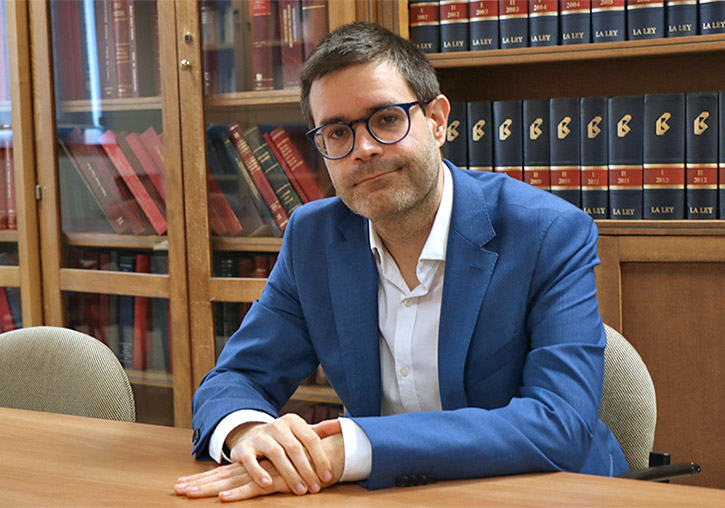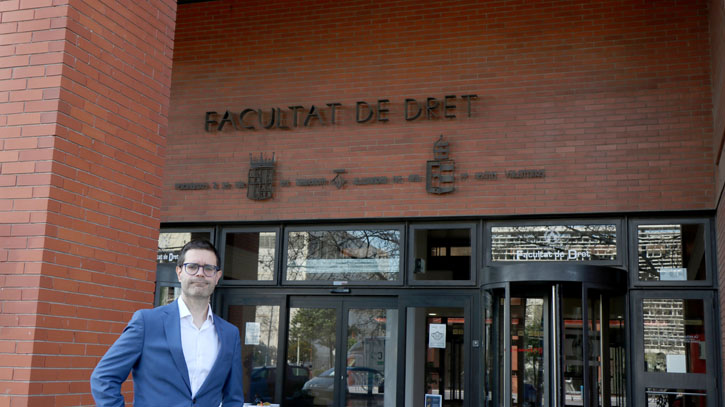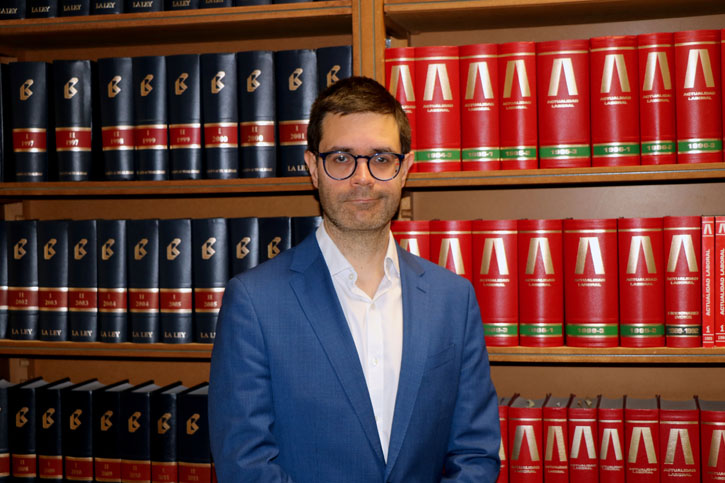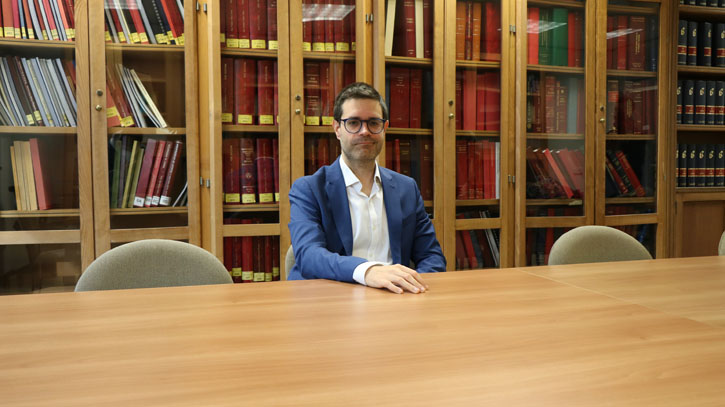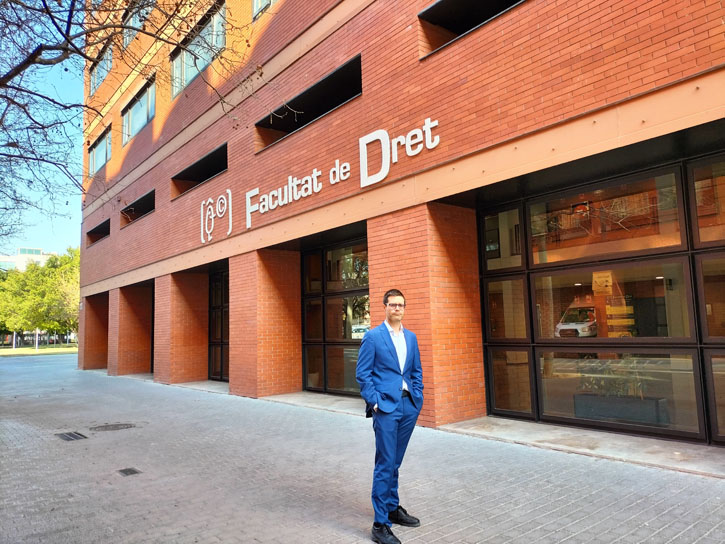Adrián Todolí: “Labour regulation improves the economy, the productivity of companies and competitiveness”
- Scientific Culture and Innovation Unit
- March 28th, 2022
Adrián Todolí Signes, professor at the Department of Labour and Social Security Law at the University of Valencia (UV), has dedicated a large part of his career as a researcher to mediating between law and economics. He has published more than 65 research items, only taking into account publications in indexed journals, books and book chapters. He is also director of the Chair in Collaborative Economy and Digital Transformation of the UV.
In his latest work, Labour regulation and economic policy. On how labour rights improve the economy (Aranzadi, 2021), he defends that the improvement in the working conditions of workers favours not only these, but also the economic efficiency of a country. All his investigative work is committed, precisely, to a responsible regulation of labour law.
1. What led you to mediate between labour law and economics in your research?
My doctorate was in Labour Law and I am currently a professor in that area, but when it comes to analysing legal regulations or what labour law should be like, I always try to incorporate an economic perspective. I studied both careers and I liked both. Possibly not knowing which one to prefer, and although I finally teach law, I have always tried to mediate between the two.
2. You also direct, together with Professor Andrés Boix, the Chair of Collaborative Economy and Digital Transformation of the UV. What is your job?
The chairs are an instrument used by the university to collaborate with external public and private institutions that are interested in university research and its dissemination. We intend to spread knowledge to society in terms of Collaborative Economy and Digital Transformation, and we address how it influences citizens and how it should be regulated. We have made reports about Airbnb, collaborative mobility, the use of scooters through platforms, bike lanes, UBER, Cabify... companies that are changing the way we move within the city of Valencia. Also in terms of digital platforms: Glovo, Deliveroo and many others. Basically, we study how technology is changing our way of living and we try to regulate its operation to avoid social damage.
3. The Chair organises conferences, lectures and public debates. Do you deem important to put your research in direct contact with society?
I believe that the knowledge that is generated in universities, especially in public ones, has to serve to improve society, and for that it is necessary to transmit said knowledge. This cannot be generated and remain within the university space. Obviously we, as teachers, transmit this knowledge to our students, but I don’t think it should be the only focus of attention. It is necessary to hold conferences open to everyone, where professionals from the sector, politicians or administrative workers can attend to be informed in order to make better decisions. That is what I intend with my research: that the State, through the contract that I have as a researcher, obtain results for the benefit of social interest. Philosophically, it has always been studied what the general interest is and how to improve it, but one of the ways is to help people who are in a worse situation in life. If we improve the best, we will contribute little in terms of justice.
"We study how technology
is changing our way of living
and we try to regulate its operation
to avoid social damage"
4. In his last book he states that the social scientist must mediate between conflicting positions with arguments, destroy prejudices and myths. What difficulties do you observe today in carrying out said mediation?
In recent years the debate has been reduced to gimmicky messages. Even the political part tries to simplify its message as much as possible so that people, who have little time, keep the minimum. This simplification removes all nuance from a debate and provokes extreme messages. However, to explain the complexity of an issue, where not everything is black and white, a slow debate is necessary. That is what we hardly have today in the public sphere, both because of Twitter and because of the operation of many newspapers, interested in reducing everything to a headline. Even algorithms and echo chambers are causing the debate to disappear, since we only see people who think the same as us. As social scientists, especially from the university, we have to explain things in all their complexity.
5. Within the framework of such difficulties, you have pointed out a certain disaffection of the citizenry with respect to politics and the economy. Do you consider that this distrust towards the economic sector is deserved?
Many times the economists who go to the media to explain something go with a bias, with interests behind. They are not independent or neutral researchers who simply explain things, but rather select content in defense of a bank, a hydroelectric plant or a specific company to which they belong. They do not show the facts as they are, but from interested perspectives that are obviously legitimate for the company. This produces a general mistrust of citizens towards all of them, when in reality the vast majority of economists do their studies in a neutral manner. The problem arises when only the biased ones are given a voice. Consequently, the population ends up mistrusting the data. Data, however, is indispensable for any analysis.
"The vast majority of economists
do their studies in a neutral manner.
The problem arises when only
the biased ones are given a voice"
6. What is the main objective of your latest book, Regulación del trabajo y política económica. De cómo los derechos laborales mejoran la economía?
In terms of labour regulation, the objective is to modernise the Labour Law discourse. The classical perspective defends the protection of workers by conceiving them as the weak party in the contractual relationship between employer and worker. This goal is still valid today, but I think it should not be the only one. First of all, because labour regulation also improves the economy, the productivity of companies and competitiveness. In this sense, the book aims to clarify the economic improvements that regulation implies beyond the protection of workers.
7. An issue that you denounce is the unfounded fears of economic regulation. Why do you think causes such fears of state intervention?
Precisely since we have been listening to the message of deregulation for almost forty years. The majority discourse, especially since the Washington Consensus in 1980, defends that deregulation is necessary to improve the economy. It has been repeated a lot that the best thing is to let the market work autonomously, self-regulated, through the famous invisible hand of Adam Smith. Despite economic studies to the contrary, it is difficult to turn this idea around. Currently, people fear regulation, understanding that it harms job creation, economic growth or innovation. But that must be denied. That is why research like the one in this book is needed, already undertaken before by many others. For example, David Card, this year’s Nobel laureate in economics, has worked on the minimum wage and has shown that it does not cause unemployment. Better regulation, especially if it is well organised, produces benefits for the economy.
"Most academic studies,
as I try to show in the book,
go in this direction: better regulation
allows greater economic growth"
8. For your part, you defend that economic deregulation does not exist, right?
Yes, it is another issue. There is talk of deregulation, when in reality the labour market is always regulated, at least through the civil code. For its part, Labour Law proposes a specific regulation since the labour market does not work the same as the goods market. The Civil Code works to regulate a rental, a purchase-sale, etc., but people are not things, they work in a different way. Hence the need for specific regulations. In this sense, we speak of deregulation when basically we are talking about eliminating specific labour regulation to leave only civil regulation, which, however, is not adequate.
9. Do you think you are going against the grain of general sentiment?
If anything against the grain of public discourse, but not in academic matters. Most academic studies, as I try to show in the book, go in this direction: better regulation allows greater economic growth. However, the leap remains to be made. What most economic studies have been saying in the last ten or twenty years must be transferred to the political and social sphere.
10. Is there an international example that serves as a reference in Labour Law?
There is no exemplary model because the discourse of deregulation has affected practically all countries, at least Western ones. Also, each country is very different. However, it is true that there are positive things in some systems. In Germany, for example, there is strong collective bargaining that reduces social inequality, with a high minimum wage and short working hours. In addition, they achieve better productivity and have strong institutions to carry out negotiation and co-management processes, where the unions participate in the organisation of the company itself through supervisory councils, giving seats and votes to the workers themselves.
"In Germany, for example,
there is strong collective bargaining
that reduces social inequality,
with a high minimum wage
and short working hours"
----------------------------
"Spain, like the rest of the countries,
has been deregulating under
the euphemistic name of flexibility"
11. In general terms, what is your opinion of Spain regarding Labour Law?
Spain, like the rest of the countries, has been deregulating under the euphemistic name of flexibility, which implies a greater unilateral power of the employer when making decisions. This may seem beneficial in the short term, but over time it harms the company’s own productivity and competitiveness. In this sense, there are important changes to be made. Now, with the 2021 labour reform, some of them have been revealed. For example, the fact that the employer could hire temporarily in fraud and without serious consequences, represented a loss of productivity, since it has been shown that a permanent worker is more productive than a temporary worker. In the medium term, this sinks our economy. Therefore, if contracts are now indefinitely and the legislation is complied with, the workers will be more productive, which also benefits the employers themselves. In this aspect, the labour reform seems positive to me.
12. Do you consider that the Spanish society is meritocratic?
Despite not having analysed society as a whole, in the world of labour relations that I have studied, I believe that meritocracy is lacking, precisely because of labour regulation. Until now, said regulation allows a worker to be fired who has not done anything wrong simply because the boss dislikes him, for ideological reasons. This goes against the principles of meritocracy. In theory, a worker should only be fired if it harms the interests of the company or if he does not provide the work that he should. However, excellent workers are sometimes fired for reasons other than work. For its part, employees who work best should be paid more, another meritocratic principle that is not developed in our legislation.
13. You advocate a new concept of worker differentiated from the genuine employer, could you briefly introduce us to this proposal?
Currently our concept of worker defines to whom labour law applies, who is entitled to having holidays, etc. We think that everyone has the right to having holidays, but no. Only those who are labour workers according to the workers’ statute have it. There are many self-employed workers who do not have a series of rights that we could consider basic.
This differentiation is made historically when these institutions were formed for the first time more than a hundred years ago, when there were very few self-employed. At that time, the self-employed person was a true entrepreneur as the owner of the factory. But today, the lack of enforcement of the workers’ statute has gotten out of control and more and more people are being left without labour rights. I try to turn this around. In my opinion, the only one to whom we should not apply such rights is the genuine entrepreneur, but not all self-employed workers. The workers of Glovo and Deliveroo, for example, are considered entrepreneurs, but in reality they work as labour for a company that needs carriers. These people, who are not businessmen, should be subject to labour law.
"The lack of enforcement of the workers’
statute has gotten out of control
and more and more people
are being left without labour rights"
14. Currently, the European Commission is studying the development of a European directive on work on digital platforms. What are the main drawbacks to overcome in this regard?
Teleworking problems often depend on the person. One of them is segregation based on sex or gender when including this modality. Thus, when teleworking is incorporated for conciliation issues, it is mostly women who telework while taking care of their children at home. This is a problem since it deprives such workers of sharing a common space with the rest of their colleagues. Another challenge to overcome are the psychological problems that some studies have detected due to isolation, lack of differentiation between work space and rest space, the irregular lengthening of working hours and the lack of digital disconnection.
15. What are you currently working on? Are you working on a new book?
I have always worked a lot on digitisation. One of the great current challenges is how automation is affecting the labour market. This automation often means laying off workers who are replaced by robots. In principle, it should not be bad since, according to what Schumpeter calls “creative destruction”, technology eliminates jobs, but it also improves economic performance and creates new jobs. Thus, I am analysing what is now called the Fourth Industrial Revolution, seeing what happens to unemployed workers in the transition between losing and finding a new job, and discerning how to get their job back without risk of exclusion. From basic income to guaranteed work, there are several proposals that face this challenge of the disappearance of jobs due to automation.


